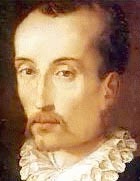Torquato Tasso Comments
***************** The first attempt to translate Gerusalemme liberata into English was made by Richard Carew, who published his version of the first five cantos as Godfrey of Bulloigne or the recoverie of Hierusalem in 1594. More significant was the complete rendering by Edward Fairfax which appeared in 1600 and has been acclaimed as one of the finest English verse translations. There is also an eighteenth-century translation by John Hoole, and modern versions by Anthony Esolen and Max Wickert. Tasso's poem remained popular among educated English readers and was, at least until the end of the 19th century, considered one of the supreme achievements of Western literature. Somewhat eclipsed in the Modernist period, its fame is showing signs of recovering. ***************** == [from Wikipedia] ==
******************* The fame of Tasso's poem quickly spread throughout the European continent. In England, Sidney, Daniel and Drayton seem to have admired it, and, most importantly, Edmund Spenser described Tasso as an excellente poete and made use of elements from Gerusalemme liberata in The Faerie Queene. The description of Redcrosse's vision of the Heavenly Jerusalem in the First Book owes something to Rinaldo's morning vision in Canto 18 of Gerusalemme. In the twelfth canto of Book Two, Spenser's enchantress Acrasia is partly modelled on Tasso's Armida and the English poet directly imitated two stanzas from the Italian. The portrayal of Satan and the demons in the first two books of Milton's Paradise Lost is also indebted to Tasso's poem. ******************* - [from Wikipedia] -

A book on Tasso, advertised on the Net, says that Tasso is famous for his Sonnet to his cats at St Ann, and that it is a satirical poem. The book quotes four or 5 lines. Obviously, this sonnet by Tasso has never got into English, and it would go viral if it did get into English and went up on the Net,